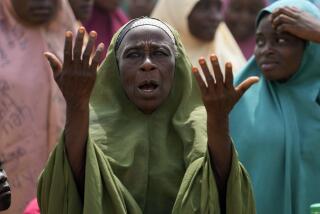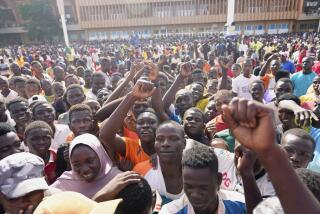Northern Nigerians Echo Southern Complaints Over Long Military Rule
- Share via
KADUNA, Nigeria — To hear southern Nigerians tell it, the people from the North in this populous West African nation are to blame for the military’s long stranglehold on power. Generals from the mostly conservative Hausa and Fulani northern clans have held tightly to control, southerners maintain, draining the South of its oil wealth and other resources and giving nothing in return to its dominant Yoruba group and ethnic minorities.
But in Kaduna, once the country’s northern seat of power under British colonialism, the tale is one of poverty, illiteracy and complaints about past regimes led by northern native sons who have neglected those sharing their heritage, language and--usually--Muslim faith.
As Nigerians braced Sunday for the country’s latest military regime to announce its plans for transition to democracy and civilian rule, many northerners were openly declaring their hope that the army, which has held power for most of the last four decades, would make way for civilian--and even southern--leadership.
“The people in the North can’t see any gain from having a northern president,” said Abdulkadir Balarabe Musa, former governor of Kaduna state. “By independence in 1960, the North was at least 10 years behind the South in educational development. Now in 1998, the North is at least 40 years behind the South. It is the irresponsibility of northern leadership that has created that gap. . . . Let the presidency go to the South.”
So when Nigerian dictator Gen. Sani Abacha, a northern Muslim, died last month of an apparent heart attack, Nigerian scholars, analysts and community leaders here say northerners--more than anyone--heaved a sigh of relief.
“Abacha was not popular here, but the philosophy is slightly more conservative [in the North] because of the religious background; that made it slightly difficult to mobilize people to fight the regime,” said Fetus Okoye, a lawyer and executive director of Kaduna-based Human Rights Monitor. He said Abacha’s support came primarily from his security service and a clique of northern elites.
“The death of Abacha was seen as divine intervention,” he added. “People felt relieved because the opinion leaders here thought he was leading the country to the brink.”
The transition program of Gen. Abdulsalam Abubakar, Nigeria’s latest northern military leader, is expected to resolve the five years of political turmoil since the military’s annulment of 1993 elections that popular southern tycoon Moshood Abiola was widely presumed to have won.
The preliminary vote count showed that Abiola swept the North, including Abacha’s hometown, Kano. But the business mogul was jailed in 1994 for declaring himself president and died of a heart attack this month while still in custody.
Government employees in Kaduna state, where an estimated 80% of the 5.5 million people live below the poverty line, say their lives already had reached the precipice before Abacha’s death.
*
Last year, 22,000 government workers were fired for going on strike demanding better wages, and several labor leaders were jailed. Production at Kaduna’s oil refinery, one of four in the country and once the town’s main employer, has collapsed, along with business at scores of factories and textile companies.
Unemployment in this grimy, heavily polluted city is reported by numerous sources to be about 90%. All that Kaduna can boast of, residents say with scorn, is its host of military institutions.
The Nigerian Defense Academy, the Army Command and Staff College, the Army School of Infantry, a military air base and the army’s 1 Mechanized Division are all in Kaduna.
“[Average] northerners haven’t benefited at all from a northerner being in power,” said Abdulkarim Ibrahim, Kaduna state chairman of the National Public Service Negotiating Councils, a liaison group between the government and laborers. “The military leaders only take care of themselves, their wives and their family. Workers have absolutely suffered. Military people are looters. They have spoiled the economy of this country.”
The highest monthly salary for a state government job is just over $100. The cash crunch has made it difficult for small traders such as Hussain Jibril to earn a living because would-be customers cannot afford their products.
Jibril, who sells plantains from a stall on a busy thoroughfare in Kaduna, believes his livelihood has gone from bad to worse under military rule. His daily income has dropped during the past five years from $24 to as little as $6.
“We expected Abacha to do for the entire country, not just for the North,” said Jibril, 30, who is from the late general’s hometown. “But as far as I’m concerned, he didn’t do anything for anybody.”
Widespread illiteracy also has plagued the North, traditionally a feudal society and long considered the most backward region of this country of about 100 million people. The northerners’ Islamic faith made them reluctant to embrace the education being offered by the Christian missionaries who flooded the South before independence.
Little was done by past leaders to improve the nation’s educational system, allowing the military to keep its grip on power but leaving the imbalance between North and South in place. Now northerners are joining pro-democracy and opposition leaders, most from the South, in agitating for the military to surrender power.
“Generally, people are fed up with the military,” said Yahaya Mahmood, a former high court judge of Kaduna state. “Each [leader] has brought some of his friends to help him steal our money.”
More to Read
Sign up for Essential California
The most important California stories and recommendations in your inbox every morning.
You may occasionally receive promotional content from the Los Angeles Times.














